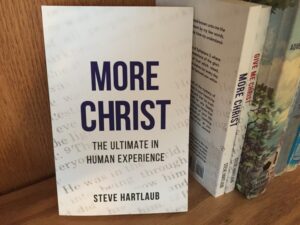.
.
Did God create us, or did we create God? Because if we created God, then we’re going to have to work very hard (and many people do) to protect Him and justify His existence to others. In this case, we’re not protecting God, actually, but rather are protecting our idea and self-creation of God. We are protecting us!
If I have a stone, and I tell you I’m going to throw the stone down very hard on the ground, do you feel threatened? Why not? Because you didn’t create the stone, and you know that the stone “can take care of itself.” Even if it breaks into pieces, what does that matter to you?
But if I tell you I don’t believe in the existence of God, would you feel threatened? And if another has a doctrine concerning their God which differs from yours, do you get indignant and angry that it doesn’t agree with your understanding or doctrine? If you do feel that way, perhaps it’s because the God you have is one you’ve created yourself; perhaps even using the Bible or the preaching of others to do so! Once you meet and get to know the one true God, you stop feeling threatened by anyone else’s unbelief (or misbelief).
(Jesus is speaking to his disciples) These things have I spoken unto you, that you should not be offended (become indignant). They shall put you out of the synagogues; yea, the time comes that whosoever kills you will think that he does God service. And these things will they do unto you, because they have not known (gnosko – known by experience) the Father, nor me. John 16:1-3
The only reason a person gets offended, angry, indignant, argumentative when they disagree with your doctrine or understanding of the Bible, of God, of Jesus Christ himself, is because they don’t actually know God. Rather, in the place of that personal spiritual relationship with God and with His son, Jesus Christ, they have manufactured their own God in their minds, staking their lives and well being on that very precarious supposition, that the God they’ve created is the one true God. In actuality, they are their own gods!
For God does know that in the day you eat thereof (of the fruit of the tree of the knowledge of good and evil), then your eyes shall be opened, and you shall be as gods, knowing good and evil. Genesis 3:5
Here’s what happened on that cursed day. Instead of becoming like God, they lost their relationship (the eternal spirit) with the true God, and from then on had to create their own, or be their own. (In life today, instead of claiming to be God, people claim to be His true representative, to represent Him truly). In being consigned to a life of having to be their own gods, they became enemies of the true God.
But as then he that was born after the flesh persecuted him that was born after the spirit, even so it is now. Galatians 4:29
It was the religious leaders of the day who desired and had Jesus, the Anointed of God, put to death. They allowed the most vile of devil spirits to direct their paths, in having the son of God tortured and put to the worst possible death. Why? Because they, in their flesh, had a self-created and self-maintained construct of God (which was actually themselves), which they, being able to impose this self-constructed God on the people they lorded over, were severely threatened once the true, actual God came into their midst in the person of Jesus. The true God and the false can not exist in peace in the same arena.
Remember the word that I said unto you, The servant is not greater than his lord. If they have persecuted me, they will also persecute you; if they have kept my saying, they will keep yours also. But all these things (out of hate) will they do unto you for my name’s sake, because they know not Him that sent me. John 15:20, 21
The Reformation of the 1500’s (and ever since), which is celebrated the world over, as the hegemony of the Roman Catholic Church was broken, did not bring about true spiritual freedom. For in the place of the Roman Catholic Church came the Lutheran Church, the Calvinist Church, etc. etc. One enslavement was exchanged for another. (This is not to negate the countless individuals who received Christ and had a true relationship with God.) If you were in the Lutheran Church, then you marched to the beat of the Lutheran-created God. If you were in the Calvinist Church, then you either marched to the beat of the Calvin-created God, or you were either banished or put to death. Today is not much different. Except in Christ.
But living in an expression of the truth in love, may grow up into him in all things who is the head, Christ: From whom the whole body fitly joined together and compacted by that which every joint (spiritual relationship) supplies, according to the effectual working (of the spirit) in the measure of every part, makes increase of the body unto the edifying of itself in love. Ephesians 4:15, 16
I’ve actually heard the following in a Sunday sermon: “It’s all by grace, there’s nothing you can do to earn God’s love… now here’s what you’ve got to do.” Seriously! Why the contradiction? Why the need for one person to impose their ideas on others of work and effort needed to please their God? Because their God is self-constructed and therefore a relationship with that God must be self-maintained. This is not the truth, but a fabrication of man.
For this cause I bow my knees unto the Father of our Lord Jesus Christ, out of whom the whole family in heaven and earth is named, That he would grant you, according to the riches of His glory, to be strengthened with might by His spirit in the inner man; That Christ may dwell in your hearts by faith, that you, being rooted and grounded in love, May be able to comprehend with all saints what is the breadth, and length, and depth, and height; And to know (gnosko – by experience) the love of Christ; which is the absolute pinnacle of all experience, that you might be filled with all the fullness of God. Ephesians 3:14-19
This is what God can and will do for you if you come to the point in your life where you are tired of needing to maintain the construct of God in your mind; when you die to the self which created (and needed to create) that God, or even the need to be God, and instead accept the work of the Christ into your life and heart. He can not begin his work, until you have ceased from your own.
For Christ is the end of the law (and all the effort it requires) for righteousness to everyone that believes. Romans 10:4
Knowing that a man is not justified by the works of the law (which is by your own effort), but by the faith of Jesus Christ, even we have believed in Jesus Christ, that we might be justified by the faith of Christ, and not by the works of the law; for by the works of the law shall no flesh be justified. Galatians 2:16
I am crucified with Christ; nevertheless I live; yet not I, but Christ lives in me; and the life which I now live in the flesh I live by the faith of the son of God, who loved me, and gave himself for me. I do not frustrate the grace of God; for if righteousness come by the law, then Christ is dead in vain. Galatians 2:20, 21
The Christ, Jesus, is our door into the presence of the actual true God, Creator of all good things, visible and invisible. Unless and until you are willing to surrender at the cross of Christ your idea of God and of what He demands of you, where all human effort has ceased in death, you will not be able to walk with the actual true God. Christ is the life of God, planted in our hearts by the faith which God imparts when and where He reveals to us the spirit of His son. Either you are willing to cease your own efforts and receive His efforts on your behalf, or you are still trying to do it on your own, partaking of the tree of the knowledge of good and evil. In this case you are living as if you are God, needing to create God in your own image, rather than allowing God to create you in His.
The transition not only begins in a moment of time, the first time God reveals to you Christ, but it continues after that by God continuing to reveal to you the spirit of His son in you. “That Christ may dwell in your hearts by faith.” (Ephesians 3) “Faith comes by hearing…the word of God.” (Romans 10) = Christ dwells in your hearts by hearing the word of God. Not by simply reading it, but by hearing it (which means by “getting it”), where it comes alive inside you. When you are ready, you will hear God speak (reveal) to you the truth of Christ. When you are done with all your own efforts, and lay them down at the cross of Jesus Christ, then God will be able to begin His own construction in your life. Then life with the true God can begin.
Since you then be risen with Christ, seek those things which are above, where Christ sits on the right hand of God. Set your affection on things above (his work and accomplishments), not on things on the earth (your own). For you are dead, and your life is hid with Christ in God. When Christ, our life, shall appear, then shall you also appear with him in glory. Colossians 3:1-4
___________________________________________
Get notified when new studies are posted by subscribing in the upper right corner. Your information will not be shared.
_______________________________
Now available on Amazon! Buy both books to supercharge your spiritual relationship with God and your reading of the Bible.
More Christ – The Ultimate in Human Experience
Give Me Christ … Revelations of the Glorified Christ



